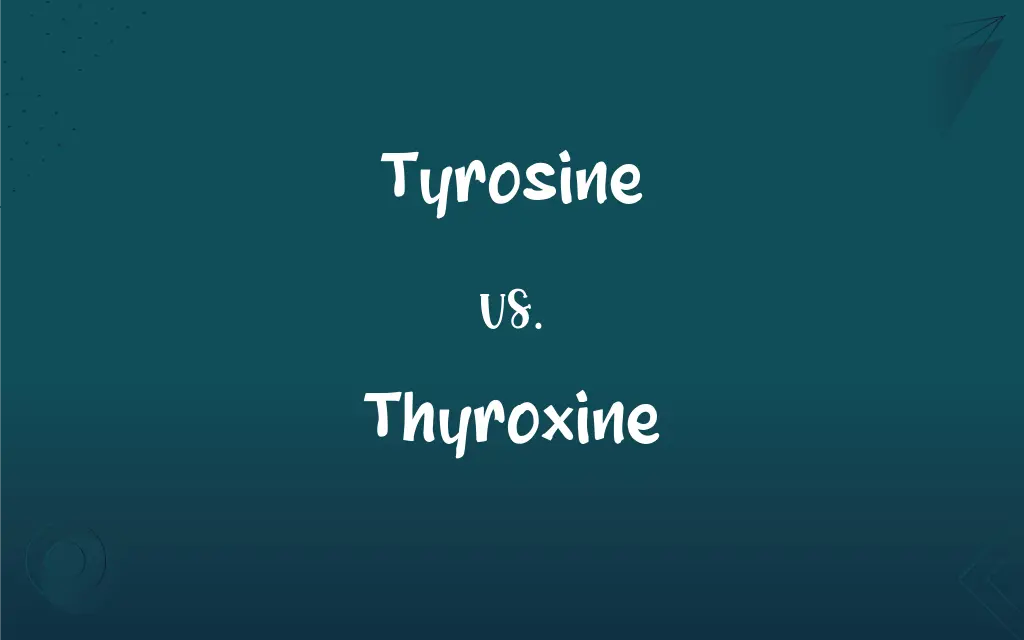Tyrosine vs. Thyroxine: What's the Difference?
Edited by Aimie Carlson || By Harlon Moss || Published on January 6, 2024
Tyrosine is an amino acid used in protein synthesis. Thyroxine (T4) is a hormone produced by the thyroid gland, influencing metabolism.

Key Differences
Tyrosine is one of the 20 standard amino acids used by cells to synthesize proteins. Thyroxine, on the other hand, is a hormone derived from tyrosine, produced by the thyroid gland.
The role of tyrosine extends beyond protein synthesis; it's a precursor for neurotransmitters and hormones. Thyroxine plays a critical role in regulating metabolism, heart rate, and growth.
Tyrosine can be obtained from dietary sources like meat and cheese. Thyroxine levels in the body are regulated by the thyroid gland and are crucial for normal body functioning.
Deficiencies in tyrosine can affect protein synthesis and neurotransmitter production. Imbalance in thyroxine levels can lead to disorders like hypothyroidism or hyperthyroidism.
In biochemistry, tyrosine is known for its phenolic group, affecting its reactivity. Thyroxine contains four iodine atoms, which are critical for its biological activity.
ADVERTISEMENT
Comparison Chart
Nature
Amino acid
Thyroid hormone
Role in the Body
Protein synthesis, neurotransmitter precursor
Metabolism regulation, growth, heart rate
Dietary Source
Meat, cheese, nuts
Not dietary, produced by the body
Deficiency Impact
Affects protein and neurotransmitter synthesis
Leads to metabolic disorders
Chemical Structure
Contains a phenolic group
Contains four iodine atoms
ADVERTISEMENT
Tyrosine and Thyroxine Definitions
Tyrosine
Protein Component.
Tyrosine is essential in the structure of enzymes.
Thyroxine
Metabolic Regulator.
Thyroxine is crucial for maintaining a healthy metabolism.
Tyrosine
Neurotransmitter Precursor.
Tyrosine is converted into dopamine, a vital neurotransmitter.
Thyroxine
Energy Metabolism.
Thyroxine influences the body's rate of energy consumption.
Tyrosine
Enzyme Activator.
Tyrosine plays a role in activating certain enzymes.
Thyroxine
Thyroid Hormone.
The thyroid gland produces thyroxine to regulate bodily functions.
Tyrosine
Melanin Precursor.
Tyrosine is involved in the synthesis of melanin in the skin.
Thyroxine
Growth Influencer.
Thyroxine plays a role in normal growth and development.
Tyrosine
Dietary Amino Acid.
Foods high in tyrosine include chicken and almonds.
Thyroxine
Iodine-Containing Hormone.
The structure of thyroxine includes four iodine atoms.
Tyrosine
A nonessential amino acid, C9H11NO3, that is produced in the body from phenylalanine and is a precursor of melanin and of several neurotransmitters and hormones, such as epinephrine and thyroxine.
Thyroxine
An iodine-containing hormone, C15H11I4NO4, produced by the thyroid gland, that increases the rate of cell metabolism and regulates growth. A synthetic form is used in the treatment of thyroid disorders.
Tyrosine
(amino acid) A nonessential amino acid 2-amino-3-(4-hydroxyphenyl)propanoic acid found in most animal proteins, especially casein
Thyroxine
(hormone) A hormone (an iodine derivative of tyrosine), produced by the thyroid gland, that regulates cell metabolism and growth.
Tyrosine
An amino acid found in most proteins; a precursor of several hormones
Thyroxine
Hormone produced by the thyroid glands to regulate metabolism by controlling the rate of oxidation in cells;
Thyroxine is 65% iodine
FAQs
What happens if thyroxine levels are too high or low?
Imbalances can lead to hyperthyroidism (high levels) or hypothyroidism (low levels), affecting metabolism and overall health.
What is thyroxine?
Thyroxine, also known as T4, is a hormone produced by the thyroid gland, vital for metabolism and growth.
Does thyroxine affect weight?
Yes, as it regulates metabolism, it can impact body weight.
Can tyrosine be synthesized in the body?
Yes, tyrosine can be synthesized from phenylalanine, another amino acid.
How is tyrosine related to thyroxine?
Tyrosine is a building block for the synthesis of thyroxine.
Is tyrosine found in every protein?
Tyrosine is a common but not universal component of proteins.
What foods are high in tyrosine?
High-tyrosine foods include dairy products, meats, fish, and nuts.
What is tyrosine?
Tyrosine is an amino acid used by the body for protein synthesis and as a precursor to several neurotransmitters and hormones.
How is tyrosine metabolized in the body?
It's used in protein synthesis and converted into various neurotransmitters and hormones.
How does stress affect tyrosine levels?
Stress can increase the need for tyrosine, as it's used in the synthesis of stress-related neurotransmitters.
Can you take thyroxine as a supplement?
Thyroxine supplements, usually synthetic, are prescribed for thyroid disorders.
Is thyroxine essential for children's development?
Yes, it's crucial for growth and development in children.
What role does thyroxine play in heart health?
It influences heart rate and overall cardiovascular function.
How is thyroxine administered for thyroid issues?
Typically, as an oral medication.
Does tyrosine intake affect skin pigmentation?
Yes, as it's involved in melanin synthesis.
How quickly does thyroxine work in the body?
It can take several weeks to adjust the body's metabolism.
Is tyrosine supplementation safe?
Generally, but it should be done under medical supervision, especially for those with certain health conditions.
How does tyrosine affect brain function?
As a precursor to neurotransmitters, it's essential for mood and cognitive function.
Can vegetarians get enough tyrosine?
Yes, through plant-based sources like soy, seeds, and nuts.
Can tyrosine supplements boost thyroid function?
Indirectly, as it's a precursor to thyroid hormones, but supplementation should be medically advised.
About Author
Written by
Harlon MossHarlon is a seasoned quality moderator and accomplished content writer for Difference Wiki. An alumnus of the prestigious University of California, he earned his degree in Computer Science. Leveraging his academic background, Harlon brings a meticulous and informed perspective to his work, ensuring content accuracy and excellence.
Edited by
Aimie CarlsonAimie Carlson, holding a master's degree in English literature, is a fervent English language enthusiast. She lends her writing talents to Difference Wiki, a prominent website that specializes in comparisons, offering readers insightful analyses that both captivate and inform.






































































